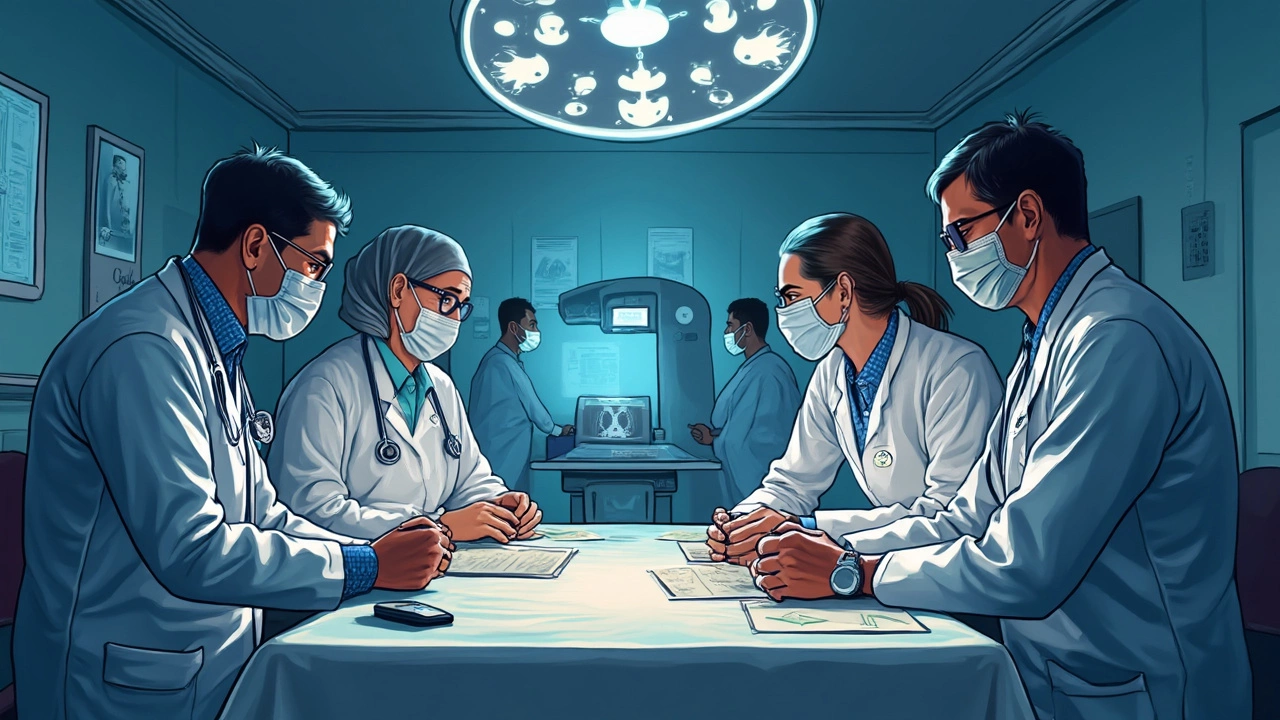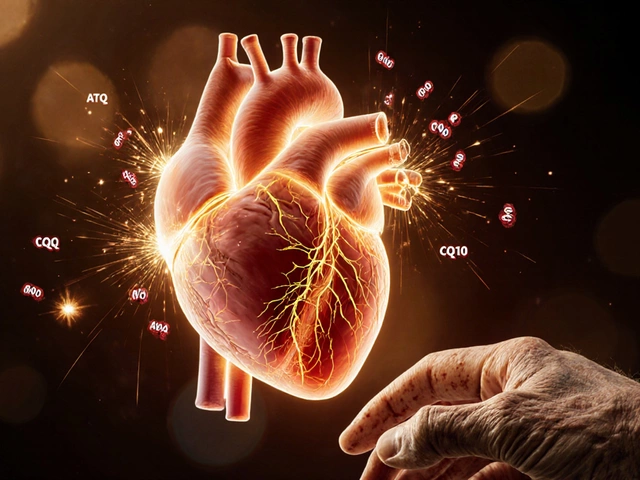Talking about cancers that really keep us up at night, pancreatic cancer is right up there. It's the kind that sneaks up because it doesn’t show itself much until it's already caused a ruckus. To give you an idea, this cancer has one of the lowest survival rates, which is alarming.
Many people don't notice anything wrong until it's pretty late in the game. Which begs the question, why is it so hard to catch early? Well, the pancreas is quite shy, tucked away where even our best scans don't always get the whole picture.
So, what can be done? The trick is to know the symptoms, no matter how subtle they might be. Common ones include jaundice, weight loss, and abdominal discomfort. You know your body best, so if something feels off, it’s worth a chat with your doctor.
Treatments like surgery, chemo, and radiation are on the table, but they aren't always effective, especially if the cancer is caught late. Researchers are hard at work looking for better options, like targeted therapies and better diagnostic tools.
- The Grim Reality of Pancreatic Cancer
- Why Early Detection is Tough
- Symptoms: Spotting the Silent Killer
- Current Treatments and Their Challenges
- Research Hopes for the Future
- How to Stay Proactive
The Grim Reality of Pancreatic Cancer
Pancreatic cancer is like the stealthy villain of the cancer world. It's notorious for having a low survival rate, with only around 10% of patients making it past the five-year mark. That's a pretty scary stat and puts it on the map as one of the deadliest cancers out there.
You're probably wondering why it's so tough to survive. Well, a big part of the problem is that it's often diagnosed late. This type of cancer hides in the belly near major organs like the liver and intestine. By the time it rears its head, it may have spread, making treatment options limited and less effective.
Another kicker? Symptoms are typically vague and can be easily brushed off. Folks might get back pain, digestive issues, or think they just have a bout of the flu. This delays diagnosis and allows the pancreatic cancer to sneak into later stages.
Unlike other cancers where early detection tests are common, pancreatic cancer doesn't have a reliable screening test yet. Doctors often rely on blood tests, imaging scans, and sometimes even endoscopic procedures to pinpoint the problem. But these don't always catch the disease in its early stages.
In terms of treatment, it's a hard nut to crack. Surgery, chemo, and radiation can be options, but their effectiveness drops as the disease advances. The tricky location of the tumor also means surgery can be complicated or downright impossible if the cancer has spread.
Here's hoping that ongoing research will offer new light at the end of the tunnel. Scientists are busy exploring innovative treatments like immunotherapy and targeted drugs that go after cancer at its core. While we wait for breakthroughs, spreading awareness is key to helping people recognize symptoms and consult doctors sooner.
Why Early Detection is Tough
Spotting pancreatic cancer early is a bit like finding a needle in a haystack. The cancer survival rate is tragically low because it's often caught late. But why is that the case? Let's break it down.
First off, the pancreas is tucked away in the body behind the stomach. This makes it harder to feel or see during routine exams compared to other organs. It’s not exactly hiding, but it might as well be. Most folks don't even know something's wrong until it starts causing real havoc.
Another big hitch is the lack of clear symptoms in the early stages. Many people experience vague and easily misinterpreted symptoms, like back pain or upset stomach. Who hasn't brushed these off now and then? That’s why there's often a delay before people seek medical help.
On top of that, there aren't specific screening tests for pancreatic cancer, unlike breast or colon cancer. Tests like blood work and imaging might help, but they’re not foolproof or specific. By the time you suspect something and get the right imaging done, the disease can be more advanced.
Check out this quick comparison of common cancers and their methods of early detection:
| Cancer Type | Early Detection Method |
|---|---|
| Breast | Mammogram |
| Colon | Colonoscopy |
| Prostate | PSA Test |
| Lung | Low-dose CT scan |
Notice how pancreatic cancer doesn't have a listed test? That's what makes things tricky. As we wait for progress, being aware of risks and talking to doctors about any unusual symptoms is crucial. Knowledge and observation are our first lines of defence.
Symptoms: Spotting the Silent Killer
Pancreatic cancer, often labeled as a silent killer, is notorious for its sneaky nature. Most folks don't suspect anything's up until the late stages. Why? Its symptoms are subtle and easily mistaken for other less serious issues.
First off, keep an eye out for jaundice. Yellowing of the skin or eyes could be one of the early signs, thanks to the buildup of bilirubin as a result of the cancer affecting the liver’s normal functioning. It’s more noticeable and often one of the earlier flags.
Another common sign is unexplained weight loss. It might seem like a blessing to shed a few pounds without trying, but if it happens alongside other symptoms, it’s worth a closer look.
Then there's that pesky abdominal pain. It typically starts in the upper abdomen and might even seem like indigestion. Sometimes it spreads to the back and gets worse when you lie down or after eating.
- Pancreatic cancer often messes with your digestive system, so anyone noticing lingering digestive problems like nausea or an upset stomach should be cautious.
- Fatigue is also a big one. We all feel tired occasionally, but if you can't shake it, even with extra rest, it's something to consider.
- Dark urine and light-colored stools are also on the list. These changes in bodily functions are signs that the bile duct might be blocked.
Don’t shrug it off if these symptoms match what you’re experiencing. Early consultation with a healthcare provider can make all the difference. Catching pancreatic cancer early, although tough, piles up the odds in your favor when battling this intimidating disease.

Current Treatments and Their Challenges
When it comes to treating pancreatic cancer, we're looking at a few main strategies, each with their hurdles. First up, surgery. If caught early enough and if the tumor is in a position that makes it operable, surgical removal offers the best shot. But here's the catch: most cases are found too late for surgery to be an option.
Then there's chemotherapy. It's a go-to for many cancers, and it can help—especially in shrinking tumors or managing symptoms. It's rarely curative on its own for pancreatic cases, but it can extend a patient's life. Chemo isn't a walk in the park, though. It comes with side effects like fatigue, nausea, and a whole lineup of other not-so-fun stuff.
Radiation therapy is another player in the game, typically used along with surgery and chemo. It aims at shrinking tumors, but its effectiveness can vary. Plus, it's not always easy on the body either, bringing fatigue and skin issues into the mix.
There are more adventurous treatments too. Targeted therapy and immunotherapy are part of the new wave, aiming to use the body's own defenses or focus on specific cancer cells. The challenge here? They've got potential but aren't quite there yet as primary treatments for many patients.
All of these treatments have one big thing in common—they're often more effective when the cancer is caught early. But with pancreatic cancer so often diagnosed late, they're not as successful as we'd like. That's why ongoing research is like gold here, as scientists are trying to improve how we detect and treat these cases earlier and more effectively.
Research Hopes for the Future
Despite the gloomy statistics, there's a lot happening in the world of cancer research that gives us hope. Scientists and doctors worldwide are in a constant race to crack the code of pancreatic cancer. One of the biggest priorities is finding ways to detect this tricky disease earlier. Earlier detection means starting treatment sooner and, hopefully, improving those survival rates.
A promising area of research is developing new blood tests that can identify biomarkers – basically, small biological signals that tell us cancer is afoot. It's like trying to find a whisper in a hurricane, but each advancement brings us closer. Imagine being able to catch pancreatic cancer with just a drop of blood; that's the dream.
Then there's the buzz around personalized medicine, where treatment is tailored specifically to the individual's genetic makeup. For pancreatic cancer, this means therapies that directly target the unique mutations in a person's tumor. It's still early days, but some clinical trials are showing positive results. That's pretty exciting if you ask me.
On top of that, there’s ongoing research into the role of immunotherapy. This treatment enlists our body's own immune system to fight off the cancer. While it's not yet the go-to for pancreatic cancer, ongoing studies are looking to change that. Imagine giving our cells a little superhero boost!
For those interested, here's a glance at some of the current research focuses:
- Improved imaging technologies to spot the cancer sooner.
- Gene therapy to repair or replace faulty genes causing the cancer.
- Combination therapies, which mix and match treatments for a more powerful punch against cancer cells.
All these efforts underline a critical point – knowing more about how pancreatic cancer behaves helps us fight it better. And that’s something definitely worth rooting for.
How to Stay Proactive
So, how do you make sure you're doing everything you can to stay ahead when it comes to something as serious as pancreatic cancer? It’s all about being proactive and listening to what your body might be trying to tell you.
First off, you'll want to focus on a healthy lifestyle. That means eating a balanced diet, rich in fruits and veggies, and cutting out too much junk food. Regular exercise is a biggie, too. It's not just good for your mood and weight, but it actually helps keep your pancreas in better shape.
Quitting smoking and reducing alcohol consumption are crucial steps, too. Both are known to increase risks associated with pancreatic cancer. So, tackling these habits can significantly reduce your chances of facing serious health issues down the line.
Another key is scheduling regular check-ups. Even if you feel fine, regular visits to your healthcare provider can catch potential issues before they become a problem. You might not always get a heads-up from your body, so these visits act as a safety net.
- A balanced diet with lots of fruits and veggies
- Regular exercise
- No smoking
- Limit alcohol consumption
- Regular medical check-ups
If you have a family history of cancers, especially pancreatic, talk to your doctor about additional screenings or genetic testing. Sometimes, peace of mind is knowing you're taking every precaution possible.
Keeping informed about the latest research and treatments can also help you make better decisions. The world of cancer treatment is rapidly evolving, and what we know today could change tomorrow with new findings. Being in the know means being prepared to act if necessary.
By being mindful of these steps, you’re not just waiting for problems to arise—you’re actively working to prevent them, making it one less thing to stress over.








